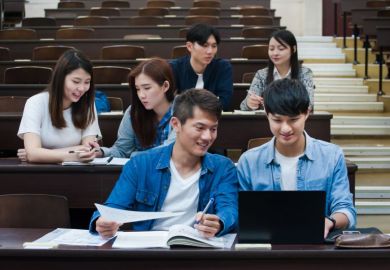Useless advice, unrealistic expectations and “reverse culture shock” undermine Australian mobility programmes, which are now under added threat from Covid-19, graduates of study-abroad schemes have warned.
A new report outlines how overseas study stints can be blighted – and, in some cases, scuttled – by misleading pre-departure intelligence about logistical issues such as working rights and access to money.
Returnees told how they had relied on travellers’ cheques in places where there was no way to cash them, and little point in doing so anyway because electronic payment apps such as WeChat Pay and Alipay were ubiquitous. Other students could not get hold of funds because verification codes needed to access their bank accounts were linked to mobile phone SIMs back in Australia.
A master’s student told how her internship at an Australian overseas diplomatic mission had been cancelled two days before she was due to leave, after organisers revised their initial advice that a work visa was not needed for the post – and suggested that she take a holiday there instead.
“This experience has tarnished my interest in undertaking an overseas internship, as it now feels like there is too much risk and uncertainty involved,” she recounted.
The accounts are outlined in a report compiled by four Australian youth organisations focused on relations with China, Indonesia, Japan and the Association of Southeast Asian Nations (Asean). The document summarises proposals from an August forum looking at student mobility in an era of “enforced immobility”.
Deakin University international education expert Ly Tran said geopolitical tensions added to the complexity. “The treatment of international students in Australia during the Covid-19 pandemic has generated both domestic and regional criticism of Australia, which in turn affects not only Australia’s inbound international student mobility but also outbound mobility to the region,” she wrote in a foreword.
The report offers 29 recommendations to improve pre-departure briefings, post-mobility “debriefs”, engagement with external organisations and support for students during overseas postings.
The proposals include “structural” suggestions such as automatically granting credit for overseas courses “unless there is a specific reason not to” and reconceptualising mobility programmes as embellishments to any course “rather than something inherent to some degree programmes and not others”.
The report highlights sexual misadventures as a minefield, particularly for female and gay students. An anonymous contributor recounts how a series of harrowing experiences – including being forced to barter the price of a friend’s abortion – left her “traumatised and disheartened”.
The student says that while she was given funding for psychological treatment, “I had to wait until I returned” and the therapist had no experience of the “unique cultural differences” she had confronted. “Without proper structure” in overseas mobility programmes, she warned, “exchange in the Indo-Pacific region will continue to be an isolating and unsustainable option”.
Register to continue
Why register?
- Registration is free and only takes a moment
- Once registered, you can read 3 articles a month
- Sign up for our newsletter
Subscribe
Or subscribe for unlimited access to:
- Unlimited access to news, views, insights & reviews
- Digital editions
- Digital access to THE’s university and college rankings analysis
Already registered or a current subscriber? Login








